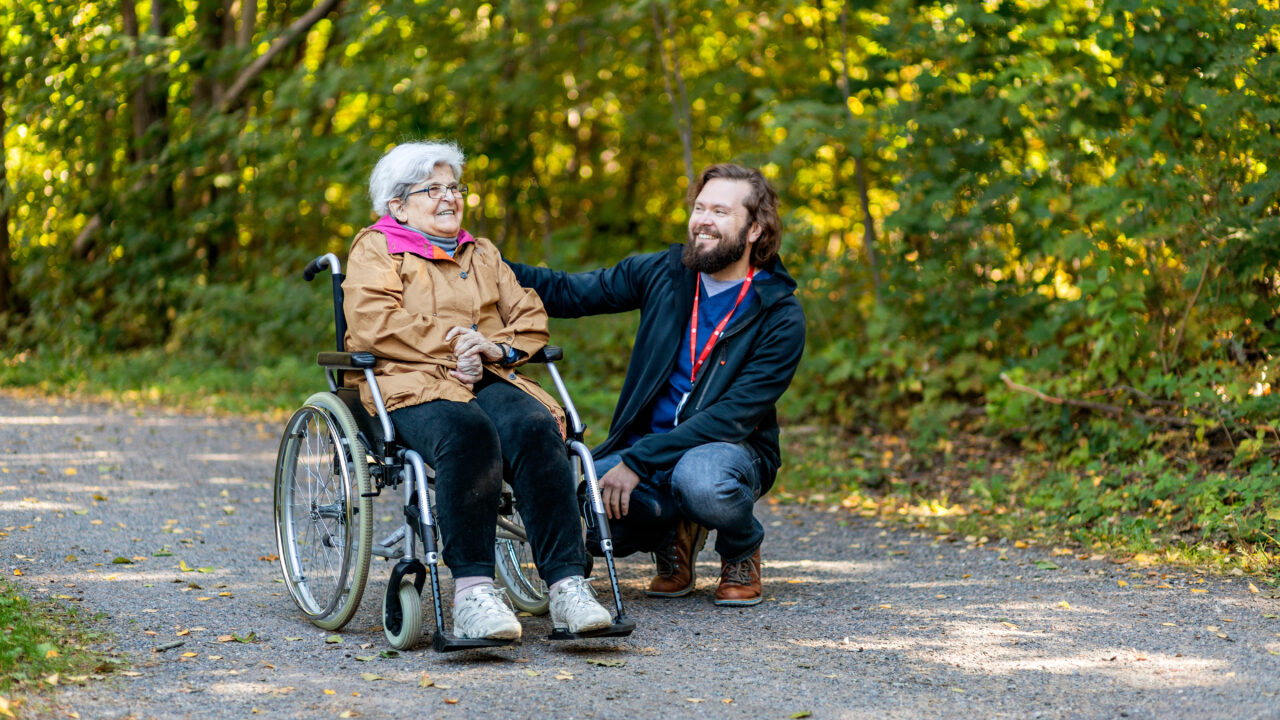We will safeguard services with the health and social services reform
Reformen av social- och hälsovårdstjänsterna samt räddningstjänsterna är den största strukturella reformen som vår välfärdsstat har sett på flera årtionden. Grunderna till reformen har rests under den gångna regeringsperioden, men vi har ännu mycket arbete kvar.
To fulfil the objectives of the health and social services reform, public provision of services must be primary, of high-quality, and sufficient. The health and social services reform is taken forward regionally and nationally to carry out integration and strengthen basic services significantly. Care pathways must be clear and continuous, and people must be at the centre of services also in the interfaces between welfare service counties and municipalities.
Long-term investments must be made in the specific, national duties of welfare service counties, as well as in research and teaching that benefit the entire country, and their funding must be safeguarded. The responsibility of organising and funding travel, medicines, and rehabilitation is transferred to the wellbeing services counties.
The development of the wellbeing services counties is to be monitored also from the point of view of equality and democracy. The right to get services in both national languages must exist in all wellbeing services counties.
The funding base of the wellbeing service counties must be reinforced. The wellbeing services counties must have a genuine capacity to make decisions about services near every one of us. This requires a sustainable funding model that ensures sufficiency of funding and encourages the counties to operate efficiently and cost-effectively. SDP supports increasing the financial autonomy of the wellbeing services counties and their opportunity to collect their own funding also through taxation.
We will ensure timely availability of health and social services
The seven day treatment time guarantee will ensure that citizens have swifter access to care in non-urgent primary healthcare situations. The reform seeks to strengthen the basic healthcare services and improve the availability of services. Investments are also needed in the continuity of care through, for example, the development and use of the personal doctor/personal nurse model.
We must continue to reduce the care, service and rehabilitation backlog caused by the COVID-19 pandemic. The impact of the pandemic to the health, functional ability and wellbeing of the entire nation must be monitored and assessed for a long time even after the epidemic slows down.
Private service provision continues to have an important role in ensuring and improving the availability of services. When private service production is used as part of publicly organised health and social services, the services must be available on the same terms and for the same client fees.

We will keep client fees reasonable
SDP’s long-term objective is to make health centre physicians’ appointments free of charge. Client fees must never prevent people from seeking services or receiving care, so we must continue to adjust the client fees in health and social services.
The necessary changes are made to shift the responsibility for tracking the accumulation of the payment ceiling of health and social service client fees away from the client. The payment ceiling is developed so that expenses will not pile up in the beginning of the calendar year and would, instead, be divided into instalments throughout the year, for those who use a lot of services.
Payment ceilings (health care, travel, medicines, travel related to adult day services and work activity) are combined to the level of, for example, the monthly guarantee pension.
Mental health problems must be prevented and treated early
Questions related to mental health are great challenges in health policy, and viable solutions to them need to be found fast. The resources of mental health services and student intake in the field must be increased rapidly.
The implementation of the National Mental Health Strategy 2030 must be continued and the construction of the mental health of children and young people in their everyday life must be set as a particular priority. The strategy must be linked with other age group strategies and programmes.

The availability of therapies and other forms of treatment according to care plans must be ensured everywhere in the country. The availability of mental health services must be paid attention to in school health care, workplaces and occupational health services, and elsewhere in the society alike. For young people who are not studying or working, services must be available, for example, in One-Stop Guidance Centres or alongside other services. Low-threshold counselling in everyday life should be available considerably more and access to it should be easier.
The Mental Health at Work Programme is continued and its actions, in particular, to promote mental health and prevent mental health problems are strengthened. Of sickness allowance days compensated by Kela, one in three is due to mental disorders, and for disability pensions the share is already over 50%. The aim of the mental health at work measures is to promote the prevention of mental health problems at workplaces and reduce sick leaves and early retirement for mental health reasons.
Anyone seeking mental health services must be guaranteed a timely and clear care pathway. Investments must be made in the availability of specialised mental health services for children and young people, and suicide prevention work must continue. Unnecessarily bouncing young people back and forth between mental health services and services for substance abusers must be stopped. Organisations have an important role in low-threshold preventative work that targets also young people. It is important that municipalities and wellbeing services counties are encouraged to cross-sectoral cooperation to develop timely and functioning services.
The assessment of mental health impacts must be developed as part of impact assessment on all levels of decision-making.
A good, meaningful and safe life to elderly people
Dignity in old age is a basic right. Every one of us must have the right to count on it that services and care are sufficient and of high quality as we age. The right of elderly people to receive services according to their individual needs based on a service need assessment must always be ensured, irrespective of their mode of living. The range of services provided at home must be diversified.
The actual realisation of staff ratios in elder care must be ensured everywhere in the country. Sufficient resources are required to monitor the ratios so that everyone can rely on their own care and the care of their loved ones to be carried out. Our objective is that elderly people can live in their home safely and get necessary high-quality services at home. When necessary, service housing with 24-hour assistance must be available at the right time so that no-one is left exposed without the care they require.

Individual housing solutions and diverse housing that safeguard the ability to function of elderly people are promoted. The availability of services provided at home will be improved and solutions that encourage implementation of gerotechnology are supported. Investments are made nationally and across administrative fields in early identification of memory disorders and a memory-friendly society. The varying service needs of people with memory disorders and the diversity of those who need support are taken into account. The implementation of the reform of services for older people is guaranteed by ensuring the availability of personnel.
Everyone’s input is needed in supporting the physical, psychological and social abilities of elderly people. The role of the civil society and organisations is particularly significant: organisations develop and try out new methods, and, when done well, various forms of voluntary work benefit both the recipients and the volunteers.
Informal and family care should be seen as an additional resource, not as a cost item. The wellbeing of informal caregivers is supported by offering, for example, free-of-charge support services and family care to enable time off. The right of informal caregivers to get an informal care contract is strengthened. The criteria for and implementation of informal care support must be equitable in the entire country. The reconciliation of informal care and employment is further improved.